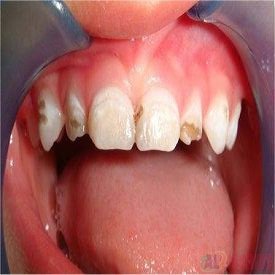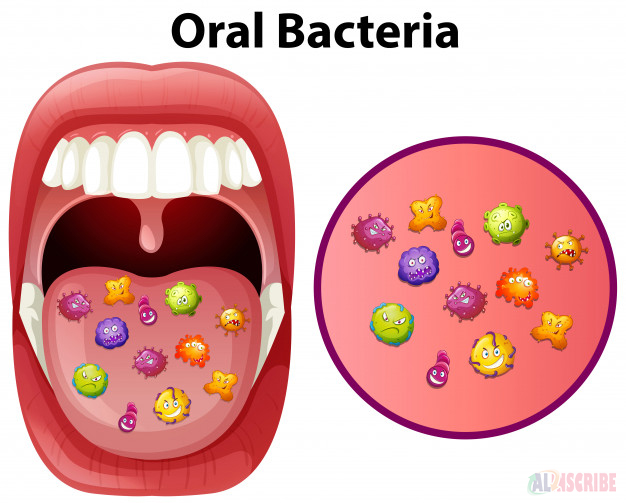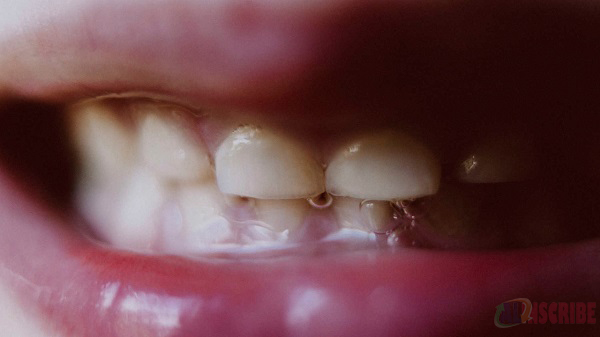How Sharing Germs Impacts Your Dental Health

We all know that germs can spread a cold or flu and that it is important to wash your hands to reduce your exposure. However, did you know that cavities, gum disease, and other infections are also spread through saliva?
Saliva does provide quite a bit of protection. It flushes germs away and contains antibodies, antimicrobial proteins, enzymes, and normal mouth flora (good bacteria) that help protect you and decrease the risk of sharing germs. However, it is not able to eliminate every risk of contagion.
Many illnesses are not spread through saliva, but quite a few are. Viruses that cause the flu, colds, mononucleosis, and hand, foot, and mouth disease are easily spread through saliva. Any virus in the herpes family is as well, and chickenpox and cold sores are both a herpes virus.
Some bacteria are also spread through saliva. One example is streptococcus. Although some strains of strep are beneficial, others can cause strep throat or gingivitis.
Oral bacteria, good or bad?

Everyone has bacterial colonies throughout their bodies. We have 10 times more bacterial cells in our bodies than human cells, and a majority of these are beneficial to us. However, when the balance is upset and harmful bacteria colonies thrive, it can negatively impact our health. An important example of this is in the mouth.
1,000 different types of bacteria can thrive in the human mouth. Someone with excellent oral hygiene will have between 1,000 and 100,000 bacteria living on each tooth, while a mouth that is poorly cared for can contain 1 million bacteria on each tooth! So, it’s not a matter of keeping the bacteria out of your mouth but of helping the beneficial strains to thrive.
What can happen when harmful bacteria thrive in your mouth.

Certain bacterial strains produce acids that attack teeth. The bacteria, acids, food particles, and saliva combine to form plaque on your tooth enamel which eventually causes tooth decay. As the plaque accumulates it becomes tartar, which is more difficult to remove and helps cavities to form more easily.
Unlike cold sores, which are contagious, you cannot get canker sores from someone else. However, research shows that people who get recurring canker sores also have a much higher concentration of two certain strains of bacteria in their oral microbiota than in the mouths of people who do not get canker sores.
Bacteria also causes gingivitis, which is the early stage of gum disease when gums become inflamed and bleed easily. If left untreated, gum disease can cause serious health problems when the oral bacteria enter the bloodstream, travel, and multiply elsewhere in the body. Infective endocarditis, stroke, and lung infections are a few of the complications that can develop in people who are at risk.
This means that, although these are not infectious diseases, tooth decay, gum disease, and other possible complications can be a result of acquiring the harmful bacteria from someone else.
A good reason to keep your saliva away from your baby
A group of scientists in the Netherlands studied how the oral microbiota (microorganisms of the mouth) are impacted by intimate kissing. After a 10 second kiss, the average couple had transferred 80 million bacteria! They also found another interesting piece of information. People who kissed and were not a couple had very dissimilar oral microbiota, while couples had a much closer composition of oral bacteria. Obviously, the frequency of kissing impacted the similarity of oral bacteria, but couples who rarely kissed also had similar microbiota on their tongues. This indicates that the long-term effect of living together impacts your oral bacterial balance.
Have you ever heard someone say that their family is prone to cavities? This may be partially due to oral hygiene practices but, even with excellent oral hygiene, cavities may still form if your bacterial balance contains large amounts of harmful bacteria. Since merely living together produced similarities in the oral bacteria of couples, it makes sense that it will also impact your children. This idea is supported by scientific research.
Infants are born with a minimal number of different strains of bacteria and their unique balance of oral bacteria is formed in the first few years of life. By the age of three, many children have formed an oral microbiome that determines their susceptibility to cavity formation. Main sources of bacteria that colonize a baby’s mouth come from the mother’s microbiota, breast milk, the skin of caretakers and siblings, and other foods. It is also impacted by exposure to other people’s saliva, which babies are particularly susceptible to because their oral microbiome is still forming. This means that if a parent has gingivitis or cavities, and their saliva makes its way into the mouth of the baby or toddler, the child is more likely to develop colonies of harmful bacteria leading to a higher chance of forming cavities and gingivitis.
You can help your family gain a healthy oral microbiome by providing plenty of prebiotics, probiotics, and healthy foods. A diet high in fresh fruits and vegetables, dairy, and fermented foods will help the beneficial bacteria in your mouth to thrive.
Practicing excellent daily oral hygiene is another important step. Bacterial plaque starts to form within a few hours of being removed, so brushing twice and flossing once every day is essential for a healthy mouth and teeth.
How can you protect your family from sharing harmful germs in saliva?

Protecting your family from germs involves more than regularly washing your hands and coughing or sneezing into a tissue. Since saliva transmits infectious diseases as well as harmful bacteria, it is important to take steps to minimize exposure to another person’s saliva.
Try not to share food or drinks. It is easy to lick dripping ice cream then give it back to your toddler, hand food to a child after taking a bite or share a water bottle on a family outing. Although it takes a bit more effort to remember, it is best to avoid these things even if everyone is healthy. It is also best to avoid kissing children on the mouth. These precautions are especially important with babies and toddlers since their oral microbiome is still forming and more susceptible to harmful bacteria that cause cavities and gingivitis.
What if you go out of town and forget someone’s toothbrush? Isn’t it important to brush your teeth even if it means you need to share it with a family member? The American Dental Association says that you shouldn’t share a toothbrush. Not only will their toothbrush bring foreign bacteria into your mouth, but brushing teeth can cause microtrauma, allowing the harmful bacteria to enter your bloodstream. If at all possible, buy a toothbrush, and if it isn’t possible to buy one then you can use your finger.
As you can see, there are many reasons to keep your germs to yourself. Although you can’t protect your family from every harmful virus or bacteria, you can take these steps to keep them, and their oral bacterial balance, healthy and thriving.
Author Bio:
At Jungle Roots Children’s Dentistry & Orthodontics, we strive to provide the highest comprehensive pediatric and orthodontic dental care in a unique, fun-filled environment staffed by a team of caring, energetic professionals. We believe the establishment of a “dental home” at an early age is the key to a lifetime of positive visits to the dentist. Ahwatukee, Phoenix.
Article Comments
Articles Search
Sponsor
There are zero sub-categories in this parent category.
There are zero sub-categories in this parent category.
There are zero sub-categories in this parent category.
















